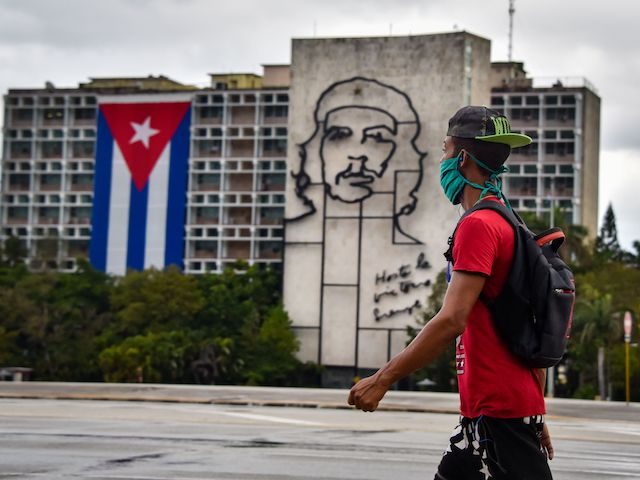Aleida Guevara March, daughter of communist mass murderer Ernesto “Che” Guevara, has urged the Cuban Communist Party to enact more violent repressive measures against the thousands of “low-class people” protesting on the island, AmericaTeVe reported on Tuesday.
Guevara, an Argentine-Irish communist who joined Fidel Castro’s small group of violent Marxists in the takeover of the country in 1959, served as economics minister in the early days of the Cuban Revolution. He spearheaded programs to build concentration camps for suspected homosexual Cubans and Christian groups, organized firing squads against political dissidents, and openly boasted to the United Nations that the Revolution intended to kill large numbers of Cuban people.
Che Guevara also wrote somewhat extensively of his racism against black-skinned people around the world and his hatred of LGBT people, considering them unsuitable for molding into the “New Soviet Man,” as communists had vowed to do with populations under their control.
Despite all this, Guevara received – and continues to receive – outsized respect in the international community. Then-President Barack Obama posed with the portrait of Guevara in Havana’s Plaza of the Revolution during his 2016 visit there. UNESCO, the United Nations world heritage agency, celebrated Guevara’s birthday in June, sharing selectively edited video of his speech to the U.N. General Assembly in 1964. Omitted from the excerpt published by UNESCO: “Firing squad executions, yes, we have executed. We execute and we will keep executing so long as it is necessary. Our struggle is a struggle to the death.”
In other writings, Guevara stated that he “really loved to kill” and upheld hatred as the paramount virtue of socialism.
Guevara remains so popular on the international left that the Cuban exile community often denounces his image in protests against the currently standing regime, urging Americans not to sport his image on t-shirts or other paraphernalia given his history as an executioner of foreign peoples (Guevara notably did not conduct any “revolutionary” activities in Argentina and never opposed Argentine leader Juan Perón).
Guevara March made her remarks in support of communist violence throughout the past week during an interview with the far-left Radio Rebelde in Argentina, AmericaTeVe reported. The station allegedly broadcast the interview in Buenos Aires on Thursday, but it began circulating heavily in Cuban diaspora media on Tuesday.
“There are things happening manipulated by the United States,” Guevara March said of the protests in Cuba, “truly low-class people, people without scruples have taken to the streets and so some fools follow. … The people have reacted very well and the situation is getting under control,” she claimed.
Guevara March added that “we,” without specifying who she meant, were demanding greater violent force from police and that authorities “act and defend what is ours.”
Like most Castro regime supporters, Guevara March also attacked the United States for its alleged “embargo” on the Cuban economy, which bans large businesses from working with the Castro regime but does not prevent shipments of any humanitarian aid, including food and medicine, and largely allows travel between the two states. Guevara March claimed that, while the Communist Party alleges to have developed its own vaccine against Chinese coronavirus, it lacks syringes due to the embargo. Guevara March offered no explanation for how this is possible given that the world’s largest manufacturer of syringes, China, is a close ally of the regime. Along with China, India produces more syringes than any other nation according to Reuters, and it, too, has no reason not to sell them to Cuba.
An estimated thousands of protesters took the streets in dozens of Cuban cities on July 11 demanding an end to communism, the vast majority of them engaging in peaceful marches to the centers of their communities. Videos of that day show the crowds to be diverse but leaning on the young side and unarmed; Cubans do not enjoy a legal right to bear arms. In response to the protests, the largest in the country in years, the Communist Party shut down the internet and encouraged communist civilians to violently assault suspected dissidents in the streets. The Party also began hosting “acts of revolutionary affirmation” – mandatory rallies – in an attempted display of support for the 62-year-old regime.
While footage of protests after July 11 has become difficult to access due to the internet shutdown, witnesses inside Cuba have testified to ongoing marches, as well as mass arrests and disappearances of participants. Human rights groups have confirmed over 500 forced disappearances or arrests of protests, a number considered low given how many people without direct ties to dissident organizations participated in the protests and how many remote communities nationwide documented the phenomenon. Many of those confirmed missing or in police custody are internationally renowned dissident leaders. Among them are the head of the Patriotic Union of Cuba (UNPACU), José Daniel Ferrer, and of the San Isidro Movement of artists, Luis Manuel Otero Alcántara.
In response to the disappearances, the mothers of the missing have called for another wave of nationwide marches on Wednesday.

COMMENTS
Please let us know if you're having issues with commenting.